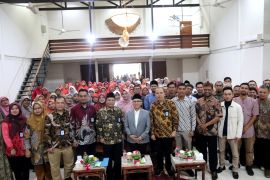Capital expenditures are among the budget posts which the government bureaucracy cannot absorb quickly enough , and this condition affects the performance of the ministries and other state institutions. According to the World Bank, ministries and other state institutions actually could increase their performance if the government increased its capital expenditures.
"Indonesia has a problem with budget absorption. It can be seen from the fact that it is unable to maximize its budget absorption at the end of the year," World Bank`s Vice President and Head of the Poverty Reduction and Economic Management Otaviano Canuto dos Santos Filho said on Monday.
Otaviano Canuto said that developing countries tended to face the same expenditure problem, namely the accumulation of expenditure funds at the end of the year. "This also happens with Indonesia, but Indonesia is one step ahead because its government has a good commitment to improving its budget management quality," Canuto said.
Canuto said that with an economic growth rate of over 6 percent, financial discipline and good fiscal performance become more important.
In order to overcome its budget absorption problem , the government will make reforms in its national budgeting and planning systems in 2012 by taking into account lessons from past experiences.
"The government is committed to optimizing the quality of its spendings to achieve better developmental results," Finance Minister Agus Martowardojo told a seminar themed "Linking Performance Evaluation to Budgeting" on Monday.
The budget system reform was expected to overcome the low budget absorption capacity problem bugging the government almost every year.
According to the finance ministry, the realization of state expenditures up to November 7 this year, for example, has reached only 69.1 percent, or Rp912.1 trillion, of the assumption in the revised 2011 state budget set at Rp1,320.7 trillion.
Moreover, according to State Treasury Director General Agus Suprijanto, unspent state budget funds (SAL) which currently totaled Rp97 trillion were projected to increase by Rp30 trillion at the end of 2011.
"There will be an additional amount of SAL because state revenues are expected to reach 100 percent of their target while state expenditures have reached only about 95 percent of their target so that there will be a balance of between Rp20 trillion and Rp30 trillion," the director general said.
Agus said the amount of SAL at present was about Rp97 trillion but it was likely to increase at the end of the year, particularly if the realization of expenditures --which were not equal to state revenues received by the state treasury-- was taken into account.
Speaking at a seminar on "Linking Performance Evaluation to Budgeting," the director general said that the estimate was based on the budget deficit projection of about 1.6 - 1.7 percent of gross domestic product (GDP).
He said that the SAL could be used to anticipate fiscal risks, sudden reversal (of capital inflow) and for emergency situation if crisis hit Indonesia.
"If the crisis happens, the people who are still under the poverty line would be hard affected and therefore, we need to anticipate it, one of the possible ways is to use the unspent budget (SAl)," the director general said.
Legislator Andi Rahmat of the House`s Commission XI on financial affairs said that the slow absorption of state budget was caused by weak coordination among the ministries and institutions concerned with goods and services procurement.
He said that capital expenditures for example had only reached 40.7 percent due to the weak coordination. "Coordination is weak in terms of regulation policy at the ministerial level and at its lower level. The business world seems also to be unfamiliar with the procurement system," Andi said.
Andi said that the government and the Government Goods and Service Procurement Policy Agency (LKPP) had conducted a review of Presidential Decision No. 54/2010 on Goods and Services Procurement, which was suspected to be the cause of the slow absorption of budget for capital expenditure.
Therefore, according to Finance Minister Agus Martowardojo, with the reforms in its planning and budgeting systems, the government was expected to be able to improve the quality of its spendings.
"To reach maximal results, Indonesia should learn more lessons from countries which have applied this system. By learning a lesson from other countries` experience, Indonesia will be able to develop a system better suited to its conditions," the minister said.
National Development Planning Minister Armida Salsiah Alisjahbana said meanwhile that the planning and budgeting systems to be implemented in 2012 were expected to create a better, more effective and efficient bureaucracy.
"This strategy requires several better reform steps because it will need institutional capacity to apply it," she said.
She said research results had shown that the government had to improve many things, namely the overall work frameworks, starting from the performance-based budgeting to implementation of mid-term spending framework.
The government also needed to evaluate and include its results in budget allocations. The same thing should also happen with the development of incentives for performance.
"Information on performance should be used to reinforce the overall performance of the decision making process," she said. (*)
Reporter: By Andi Abdussalam
Editor: Kunto Wibisono
Copyright © ANTARA 2011











